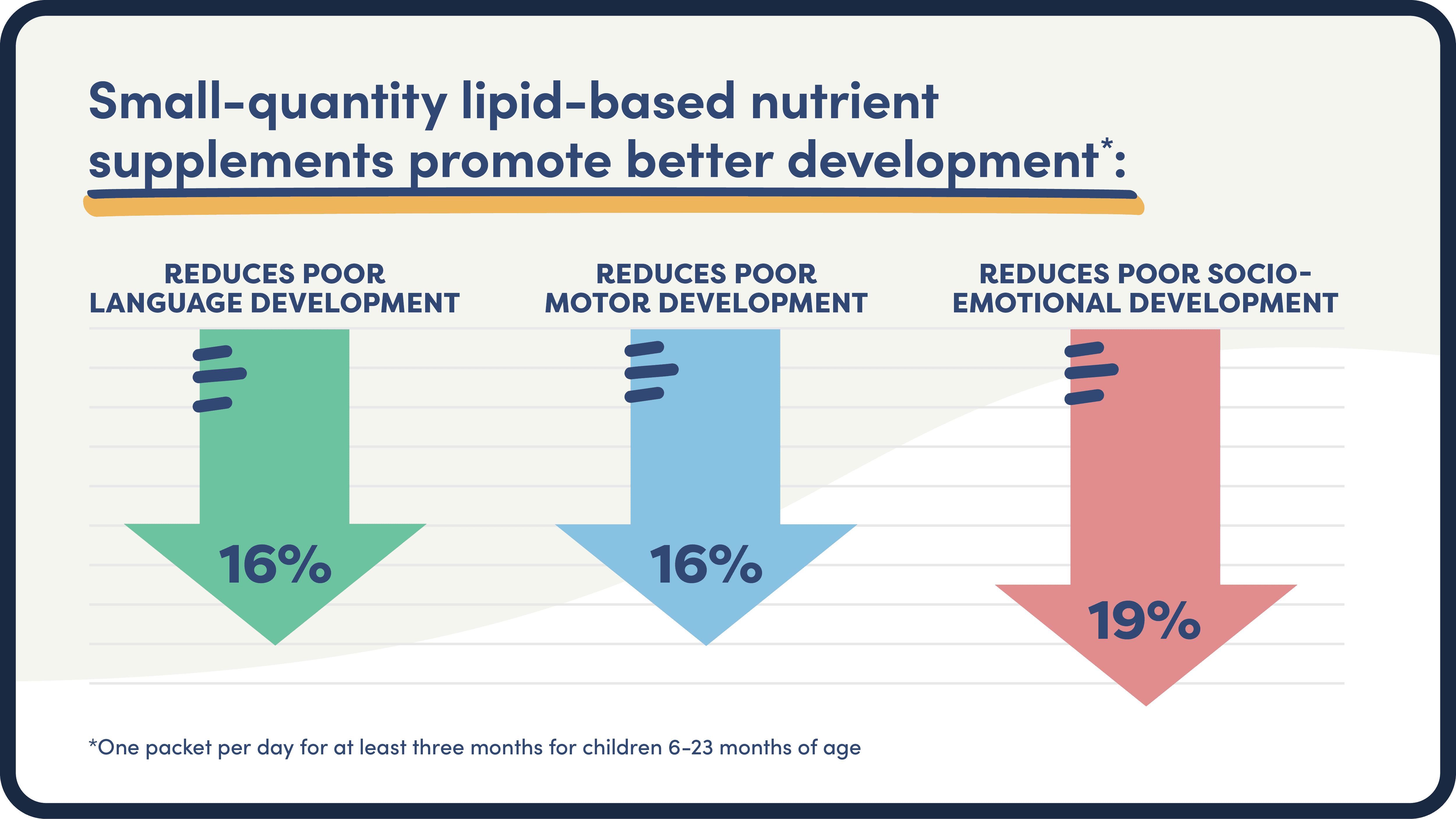Nutrition leaders urge scale-up of new intervention to prevent child malnutrition and mortality
A novel fortified food-based supplement for children 6-23 months of age can substantially reduce stunting, wasting, anemia, and developmental delay
The world is facing a crisis: millions of children and families are beset by hunger and malnutrition, made worse by the combined impact of COVID-19, climate shocks, and the war in Ukraine. For families struggling to overcome poverty, nourishing food is both unaffordable and inaccessible.
Children under two years of age are the most vulnerable. In addition to breastmilk, infants and toddlers require nutrient-rich diets to support their rapid growth and development. Yet globally, less than 30% of children ages 6 to 23 months consume a diet that meets the minimum diversity of food groups needed. The failure to provide adequate nutrition in the first two years of life has drastic consequences, as undernutrition is an underlying cause of 45% of deaths among young children.
Through a joint statement in Nature Food, a coalition of nutrition leaders from the Bill & Melinda Gates Foundation, Helen Keller Intl, UNICEF, United States Agency for International Development (USAID), University of California Davis, the World Bank, and the World Food Programme calls for rapid scale-up of a relatively new cost-effective and highly impactful preventive intervention in populations in which child undernutrition is highly prevalent and dietary quality is very poor. Used to enrich the diets of children 6-23 months of age, small-quantity lipid-based nutrient supplements would help children facing undernutrition survive and thrive.
Small quantity lipid-based nutrient supplements are small packets of a nutrient-dense paste that can be added to the food the family already feeds the young child or be consumed directly as a snack. Randomized trials in low- and middle-income countries showed that these supplements reduced mortality by 27%, severe wasting by 31%, severe stunting by 17%, iron deficiency anemia by 64%, and developmental delay by 16-19% for children between 6 and 23 months of age. Typically composed of peanut butter, oil, milk powder, vitamins, and other essential nutrients, these powerful supplements are similar to the ready-to-use foods used to treat children with acute malnutrition, but this preventive intervention requires a much smaller quantity – only four teaspoons per day.

The authors of the joint statement in Nature Food commented that, “To our knowledge, [small quantity lipid-based nutrient supplements] is the only preventive intervention for children for which a beneficial impact on all of these outcomes simultaneously has been demonstrated in vulnerable populations.” This evidence led to its addition to the list of interventions recommended for scaling up in the 2021 Lancet Series on reducing maternal and child malnutrition.
“Preventing malnutrition can avert needless deaths and save generations of children from a future of illness, poor school results, and poverty,” said Abigail Perry, Director of Nutrition at World Food Programme.“This important work shows that by expanding access to small quantity lipid-based supplements for children who need it most, we have the ability to enhance child survival and development. As acute malnutrition threatens millions of vulnerable children we must make every effort to safeguard nutrition, particularly for those who are most at risk.”
“This new evidence shows that small-quantity lipid-based nutrient supplements can have a massive impact on reducing child mortality, severe wasting, stunting, and iron deficiency,” said Meera Shekar, Global Lead for Nutrition, World Bank. “These new data show an unprecedented scale of potential benefits, and we will work towards scaling up [small quantity lipid-based nutrient supplements] in World Bank-supported operations. At a time compounded by the triple impact of the COVID-19 pandemic, increasing food prices due to climate shocks and conflicts, this intervention is even more relevant than ever before.”

And best of all, mothers and children love it. Baban Kori, a mother from Niger reports, “We observe that the child who consumes it thrives better than another child who does not consume it.” A mother in Somalia sums it up as, “I can feel it from my child that he is doing well, and his weight and his overall energy are better and even his appetite is better now.”
“Children’s futures are on the line at this very moment. It is urgent that we act now, and with proven, high impact solutions,” said Kathy Spahn, President and CEO of Helen Keller Intl. “The evidence is clear. These powerful supplements can give children a chance to live and thrive. Three decades ago, a similar convening catalyzed action to take the incontrovertible evidence of the power of vitamin A to save children’s lives and make it actionable. Today, millions of children are alive because of vitamin A. That proves that things can change if, and only if, we take action.”
By expanding access to small quantity lipid-based nutrient supplements for children who need it most, we have the ability to improve children’s lives and strengthen our global future. This means identifying financing opportunities to scale-up this intervention, supporting national governments to integrate it with other interventions to improve children’s diets, and continuing to evaluate and improve the delivery of such programs in the diverse settings where families struggling to overcome poverty live.









